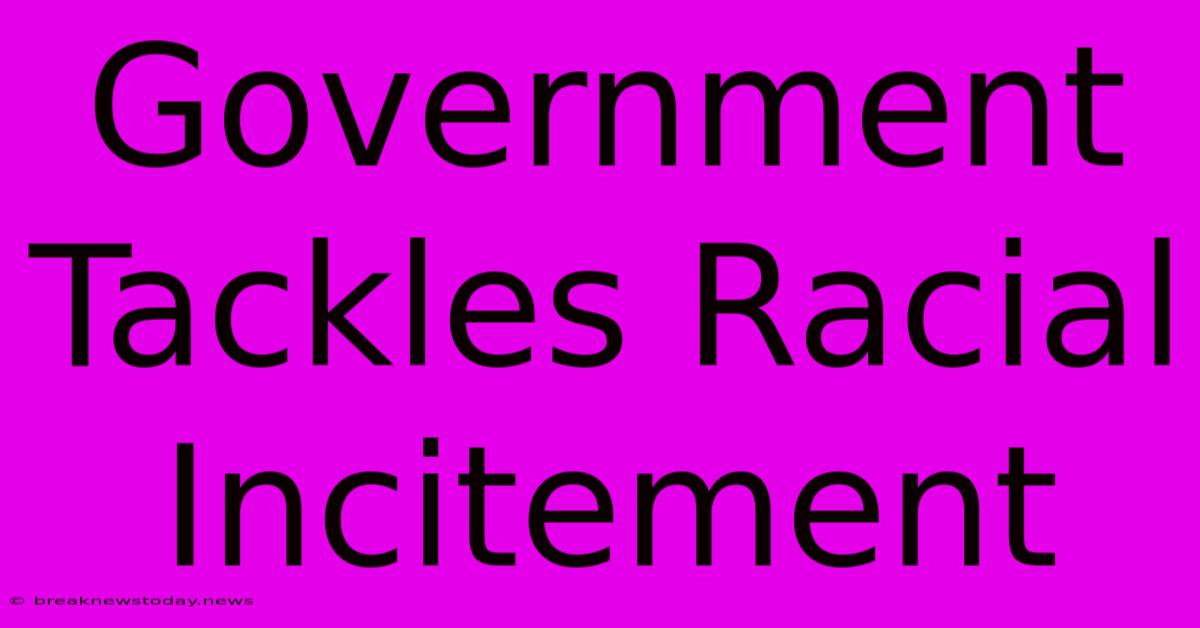Government Tackles Racial Incitement

Discover more detailed and exciting information on our website. Click the link below to start your adventure: Visit Best Website naughtynakes.com. Don't miss out!
Table of Contents
Government Tackles Racial Incitement: A Step Towards a More Inclusive Society?
The issue of racial incitement has become increasingly prominent in recent years, with its harmful effects rippling through communities and threatening social harmony. Recognizing the severity of this problem, governments around the world are taking steps to address it, implementing policies aimed at curbing hate speech and promoting inclusivity.
Understanding Racial Incitement:
Racial incitement, often referred to as hate speech, encompasses any form of expression that promotes hostility, discrimination, or violence against individuals or groups based on their race, ethnicity, or origin. This can manifest in various forms, including:
- Verbal abuse: Using racial slurs, derogatory language, or making threats against individuals or groups.
- Written content: Spreading hate propaganda through leaflets, online platforms, or social media posts.
- Visual depictions: Using imagery or symbols that incite hatred or violence.
- Inciting violence: Promoting or encouraging acts of violence against individuals or groups based on their race.
Government Actions: A Spectrum of Responses
Governments are employing a multi-faceted approach to tackle racial incitement, ranging from legislative measures to educational initiatives and community engagement programs.
Legislative Measures:
- Hate Speech Laws: Many countries have enacted laws specifically prohibiting hate speech, criminalizing the dissemination of racist or discriminatory messages. These laws often include provisions for prosecution and penalties for those who violate them.
- Online Content Regulation: Governments are grappling with the challenge of regulating online platforms, which have become breeding grounds for hate speech. This involves collaborating with social media companies to remove harmful content, develop reporting mechanisms, and implement policies to prevent the spread of incitement.
- Protecting Vulnerable Groups: Specific laws and programs may be implemented to safeguard the rights of minority groups and provide support for victims of racial incitement.
Educational Initiatives:
- Promoting Intercultural Understanding: Educational programs are crucial for fostering tolerance and understanding between different communities. This can involve teaching about diversity, promoting critical thinking skills, and challenging harmful stereotypes.
- Media Literacy: Equipping individuals with the skills to critically analyze and evaluate information, particularly online, can help combat the spread of misinformation and hate speech.
Community Engagement:
- Building Trust and Collaboration: Governments are working to build bridges between communities and promote dialogue, fostering a sense of shared responsibility in tackling racial incitement.
- Supporting Anti-Racism Organizations: Providing funding and resources to organizations working to combat racism and promote equality helps strengthen their capacity to address the issue.
Challenges and Considerations:
While these measures are vital, it is crucial to acknowledge the complexities and challenges involved in tackling racial incitement:
- Balancing Freedom of Speech: Striking a balance between protecting free speech and preventing hate speech is a delicate and often debated issue. Governments must carefully consider the potential for overreach and ensure that any restrictions are narrowly defined and proportionate to the harm sought to be prevented.
- Addressing Root Causes: It is important to recognize that racial incitement is often a symptom of deeper societal issues, such as discrimination, poverty, and inequality. Addressing these underlying problems is essential for creating a truly inclusive and equitable society.
- The Role of Technology: The rapid evolution of technology presents new challenges in regulating online content and combating hate speech. Governments must collaborate with tech companies and develop innovative strategies to address these challenges.
Conclusion:
The fight against racial incitement is a complex and ongoing endeavor. Governments have a vital role to play in creating a more inclusive and tolerant society. By implementing comprehensive policies that combine legislative measures, education, and community engagement, governments can effectively address this issue, fostering a society where everyone feels safe and respected, regardless of their race or ethnicity.

Thank you for visiting our website wich cover about Government Tackles Racial Incitement. We hope the information provided has been useful to you. Feel free to contact us if you have any questions or need further assistance. See you next time and dont miss to bookmark.
Featured Posts
-
Ev Sales Surge South African Consumers Embrace Change
Nov 02, 2024
-
Jdt Dominance Tested By Negeri Sembilan In Liga Super
Nov 02, 2024
-
Viktige Mal Lederartikkel Om Samarbeid
Nov 02, 2024
-
New Album Releases Friday November 1st 2024
Nov 02, 2024
-
Veer Zaara A Global Theatrical Re Release
Nov 02, 2024
